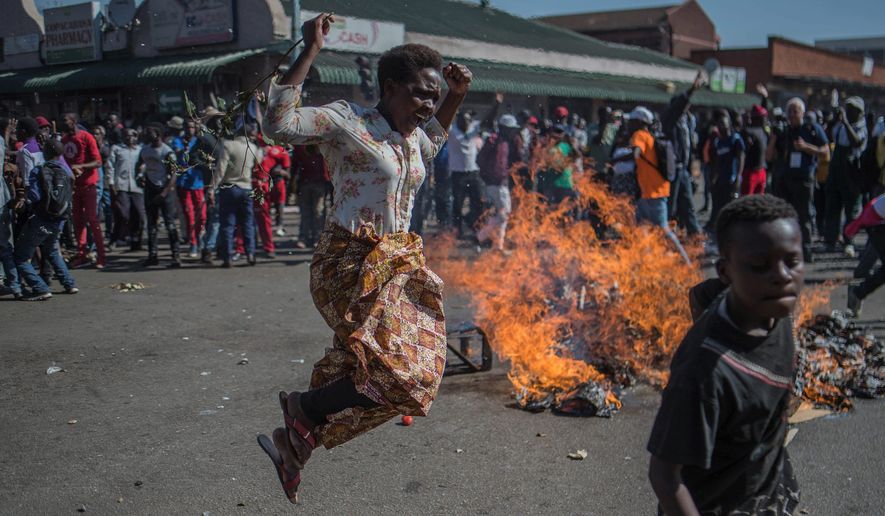Zimbabwe’s hopes to move past the long, damaging reign of ousted President Robert Mugabe hung in the balance Wednesday amid expanding violent protests and charges of ballot fraud over the results of the first post-Mugabe presidential election Monday.
Zimbabwe’s state broadcaster said three people were killed after military units employing live ammunition, tear gas and water cannons swept into the capital of Harare to disperse opposition supporters protesting preliminary results appearing to give a big victory to President Emmerson Mnangagwa. Mr. Mnangagwa is a former top aide to Mr. Mugabe who broke with him politically two years ago and promised major economic and political reforms.
According to unofficial results released Wednesday by the Zimbabwe Electoral Commission, the ruling Zimbabwe African National Union-Patriotic Front (ZANU-PF) picked up at least 109 seats in the 210-seat Parliament. The opposition party Movement for Democratic Change (MDC), whose followers earlier this week were celebrating an apparent upset victory based on their own projections, managed to win 41 seats. As of Wednesday, the winners of the remaining 58 seats had yet to be declared.
Under pressure from the MDC and international observers to complete the vote count, members of the electoral commission said they would announce Thursday when they could issue final results.
The upbeat spectacle of millions of Zimbabweans voting peacefully Monday was quickly replaced by images of tanks speeding through debris-strewn streets and soldiers beating protesters who had blocked main roads and set bonfires, The Associated Press reported. Some journalists also were attacked.
Adrienne LeBas, a former Wilson Center Africa Program fellow, said the perceptions of the vote could have long-term consequences for a country emerging from one of the world’s worst economic crises. How MDC leader Nelson Chamisa and the various parties react to the final vote tallies could prove critical.
“I don’t think we actually know how this affects electoral integrity yet. I’d like to see what the observers say before we call it a ’free and fair election,’” Ms. LeBas said in an interview.
“The more the presidential vote is delayed, the more it calls into question the population’s confidence in the election process,” former Liberian leader Ellen Johnson Sirleaf, the lead observer of a U.S. monitoring mission, told reporters in Harare.
Despite mixed analyses on the election from the European Union and the National Democratic Institute, it’s plausible that Mr. Mnangagwa and ZANU-PF were the legitimate winners, Ms. LeBas said.
“It’s entirely possible that we are going to see more evidence of irregularities surrounding the vote come out,” she said. “But overall, this election has been much freer and fairer than past elections.”
Although ZANU-PF had declared victory, MDC officials were sharply contesting the result before the final ballot count.
“The results are a gimmick to try and prepare Zimbabwe for a rigged election. If President Chamisa wins this election, then the people of Zimbabwe will have their government,” Nkululeko Sibanda, an MDC alliance spokesman, told the Al Jazeera news network.
Supporters of Mr. Chamisa blocked roads and started fires near the ZANU-PF headquarters in Harare. Police fired water cannons and tear gas on demonstrators chanting, “We will defend our vote.”
Images shared on social media showed at least two apparent protesters dead from bullet wounds.
Ms. LeBas said the clashes may be more violent than in the past.
“Definitely you have had state security being used to threaten and intimidate voters in the past,” she said. “But we’ve very rarely seen this scale of military deployment into the city center, and they were using live ammunition as well.”
Zimbabwean police have invoked a strict security act that forbids public gatherings after security forces swept into the capital to disperse hundreds of opposition protesters. The U.S. Embassy in Zimbabwe said in a statement Wednesday that it is “deeply concerned” about this week’s events.
Zimbabwean security forces should use restraint and all political parties should appeal for calm, the statement said.
• This article is based in part on wire service reports.




Please read our comment policy before commenting.